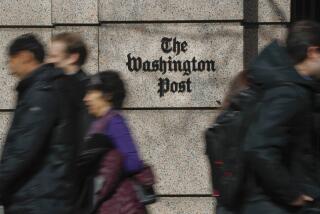Thomas Winship, 81; Editor
- Share via
Thomas Winship, who led the Boston Globe to 12 Pulitzer Prizes during nearly two decades as the paper’s editor, died Thursday. He was 81.
Winship died at Massachusetts General Hospital in Boston after a long battle with lymphoma.
As editor from 1965 to 1984, Winship inherited a paper that had not distinguished itself nationally or even locally, where it was not rated among the best of the six papers in town. One of his first steps was removing the ads that had regularly run on the paper’s front page.
Within a year after Winship took over, the Globe won a Pulitzer Prize for a series of stories on the nomination of a Kennedy family retainer as a federal judge. The articles led to the withdrawal of the nomination.
A decade later the Globe won the Pulitzer for public service for its coverage of Boston’s desegregation and busing crisis.
“The thing that strikes me about him is that he was the perfect editor for the Boston Globe at the perfect time,” said Washington Post vice president and former executive editor Ben Bradlee, who met Winship at Harvard, worked with him at the Post and remained a lifelong friend. “That was a difficult time, lots of different factions, and he was a great healer in that sense.”
“He was one of the finest editors of our time,” said Gene Roberts, former executive editor of the Philadelphia Inquirer. “He had a vision for his paper, and I thought the Globe came a long way under him. He was a force in journalism generally.”
For much of his tenure as editor, Winship also supervised the Globe’s editorial page. In that capacity, he put an end to the casual, folksy style that had been a signature of the paper and demanded hard-hitting editorials.
He held control of the news and editorial positions until 1981, when--as is the practice at many other major papers--the two operations became separate and the editorial page editor began reporting to the publisher.
An early opponent of the Vietnam War, Winship’s Globe was the second paper in the country, behind the St. Louis Globe-Dispatch, to call for a complete U.S. withdrawal. That came in 1967, and each Friday the Globe ran a front-page tally of the U.S. servicemen killed in the previous week’s fighting in the war.
By Winship’s retirement, the Globe had a reputation for strong investigative and international reporting, and its influence on Boston politics had grown considerably.
“He took this newspaper to new heights, and his devotion to it never diminished,” Publisher Richard Gilman said.
Born in Cambridge, Mass., Winship attended Harvard University and served in the Coast Guard during World War II. He began his journalism career at the Washington Post in 1945, serving as a political and city reporter. He served briefly as press secretary to Sen. Leverett Saltonstall (R-Mass.).
In 1956 Winship joined the Globe, where his father, Laurence, was editor. Taking over in 1965, Thomas quickly built a reputation for hiring aggressive young reporters.
When he became editor, the circulation of the Globe, then published mornings and evenings, was 373,897 daily and 527,969 on Sundays. During his tenure it increased to 520,000 daily and 792,786 on Sundays.
Now owned by New York Times Co., the paper’s current circulation is 465,813 daily and 716,467 on Sundays.
The most dramatic local story during Winship’s tenure was Boston’s busing crisis in 1974.
“When the worst racial turmoil in a decade flared and politicians from City Hall to the White House ran for cover or poured gasoline on the flames, Tom Winship put the Boston Globe literally in the line of fire with nothing more than the highest of journalistic values as the arrows in his quiver,” then-Globe reporter Thomas Oliphant wrote in a tribute last year for the American Society of Newspaper Editors.
Winship was past president of the group.
Winship later said he regretted not “taking a broader view” on integration, saying he would still support the idea but would have urged more gradual integration, starting with lower grades, and involving the suburbs as well as the city.
In a 1998 Journal of Media Studies article, Winship said he also regretted telling columnists not to sound off on the matter for two weeks during the height of the crisis.
He also regretted, as managing editor, calling the 1960 presidential election for John F. Kennedy as soon as the polls had closed.
In fact, it took another day for the razor-thin election to become official.
After he retired, Winship was the founding chairman of the International Center for Journalists, a nonprofit institute offering seminars to journalists from the Third World.
He also served as a director of the African-American Institute and the Committee to Protect Journalists, and as an advisory board member for the Freedom Forum’s Newseum.
In addition to his wife, Elizabeth, retired writer of the syndicated advice column “Ask Beth,” survivors include two sons, two daughters and a sister.
Funeral arrangements were pending.
More to Read
Sign up for Essential California
The most important California stories and recommendations in your inbox every morning.
You may occasionally receive promotional content from the Los Angeles Times.













